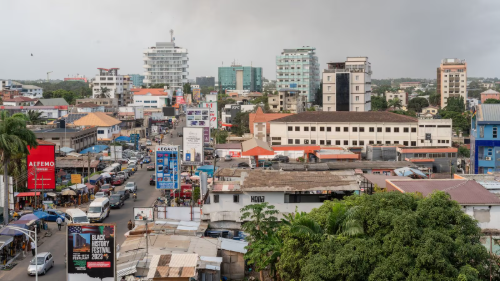Ghana Inflation Slows to Five-Month Low After Steep Rate Hike

TLDR
- Ghana’s annual consumer inflation slowed for a third consecutive month to 22.4% in March, down from 23.1% in February
- The deceleration comes just a week after the Bank of Ghana raised its benchmark interest rate by 100 basis points to 28%
- Governor Johnson Asiama has cautioned that inflation remains well above the central bank’s 8% ±2% target range and requires a tight policy stance
Ghana’s annual consumer inflation slowed for a third consecutive month to 22.4% in March, down from 23.1% in February, driven by easing food price pressures, according to the Ghana Statistical Service. “This is the lowest inflation rate recorded in the past four months,” said Government Statistician Samuel Kobina Annim. Food inflation saw a sharp drop, while non-food inflation declined marginally.
The deceleration comes just a week after the Bank of Ghana raised its benchmark interest rate by 100 basis points to 28%, surprising markets with a move aimed at reinforcing disinflation momentum. Governor Johnson Asiama has cautioned that inflation remains well above the central bank’s 8% ±2% target range and requires a tight policy stance.
Finance Minister Cassiel Ato Forson, speaking in March, projected that aggressive fiscal consolidation would help lower inflation to 11.9% by year-end.
Daba is Africa's leading investment platform for private and public markets. Download here
Key Takeaways
Ghana’s inflation slowdown provides some relief, but price growth remains well above target, reinforcing the central bank’s hawkish stance. The March rate hike to 28% underscores concerns over persistent inflationary risks, even amid moderating food prices. The government has committed to deep spending cuts to stabilize the macroeconomic environment, with a target of nearly halving inflation by December. Yet, risks remain, including currency pressures, imported inflation, and global commodity price volatility. For policymakers, balancing tight monetary policy with fiscal discipline will be key to restoring investor confidence and sustaining IMF-backed reform momentum. Financial markets will be watching closely for signs of policy effectiveness and consumer price stability heading into the second half of the year.

Next Frontier
Stay up to date on major news and events in African markets. Delivered weekly.
Pulse54
UDeep-dives into what’s old and new in Africa’s investment landscape. Delivered twice monthly.
Events
Sign up to stay informed about our regular webinars, product launches, and exhibitions.




